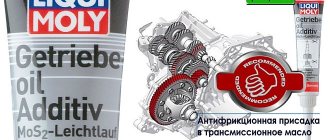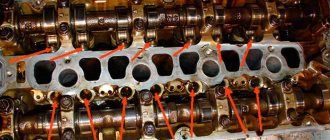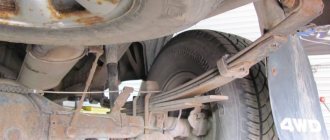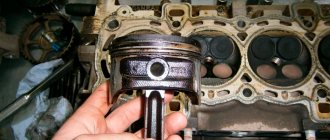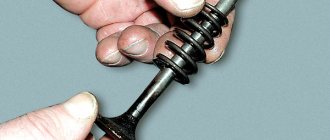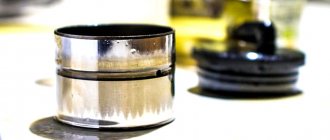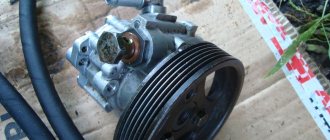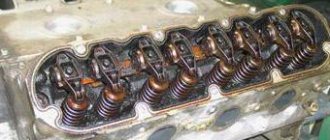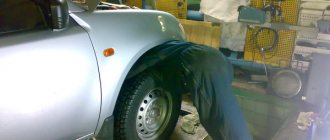The problem of hydraulic lifters knocking is a common problem. You can rebuild the engine, but it will take a long time and is not cheap, or you can use additives for hydraulic compensators (HC). Car owners choose the second option more often. Additives help against knocking and quickly put the car in order. However, there are a number of nuances that the car owner needs to take into account. Additives may not always give the desired effect, and not all formulations may be suitable for this.
I have come across quite a few such compounds on the automotive market. Each product was developed for different types and brands of vehicles. It is difficult for novice car enthusiasts to cope with the choice of a suitable composition. The information presented in my review will help with this.
Purpose of additives for hydraulic compensators
Such compositions are an additive that prevents the formation of deposits in oil channels and hydraulic compensators. The main task of the substance is to reduce the noise level in the mechanism. Reducing noise ensures uninterrupted operation of the mechanism and all structurally important components of the vehicle.
Many additives contain substances that act as a thickener. This increases the effectiveness of additives. Additives can be used with different types of engines - poured into a diesel or gasoline unit.
Types of oil additives
- Working on a chemical level. They contain synthetic friction modifiers, such as zinc and tungsten compounds, which act on the metal surface. (Motor Protect). Such formulations significantly improve the properties of the oil and provide better protection for diesel engines with a particulate filter.
— Compositions in which solid lubricants become the main active element. For example, molybdenum disulfide or microceramics. The first substance is part of the MoS2 suspension, Oil Additive. This additive covers the surface with a stable protective layer. Especially suitable for SUVs.
- Universal. They combine the best qualities of the two previous classes.
Possibilities of additive compounds
The capabilities of a specific additive depend on the composition. Before purchasing a product, you should carefully study the label and make sure that the additive is suitable for reducing noise in hydraulic compensators.
All additives in this group have the following capabilities:
- improving the properties of motor oil;
- the quality of the lubricant for individual engine elements increases;
- additional cleaning of engine valves;
- the possibility of using the substance on different types of engines;
- absence of environmental problems and complete safety for humans.
A large number of possibilities allows you to solve the problem of knocking in the main battery. At the same time, the opinion of car enthusiasts is divided on the issue of the possibility of using additive compounds. The composition of the additives is such that they can perform flushing functions. On the other hand, with additives the oil becomes less viscous, easily penetrates through the oil channels and all deposits penetrate inside.
Why are hydraulic compensators knocking?
The reasons for the appearance of knocking noise from hydraulic compensators may be low engine oil pressure in the internal combustion engine system, poor oil quality, or due to increased clearances of mating parts. The valve clearances themselves can be adjusted in two ways.
The normal cause is considered to be the knocking of hydraulic compensators when cold, that is, when the engine has just been started and it has not had time to warm up. But this knock should disappear after a few seconds. If the knocking does not go away, the engine is already hot, then this indicates an unscheduled repair. If you do not do minor repairs, then you will have to do a major overhaul of the engine.
A hydraulic compensator is a device that regulates the thermal clearance of the valves of the gas distribution mechanism (GRM). In simple words, a hydraulic compensator is a plunger into which engine oil comes from the internal combustion engine system.
The hydraulic compensator is located between the valve and the timing shaft cam. At the moment the valve is completely closed, the hydraulic compensator is pressed against the camshaft cam by a spring. While turning the shaft, the cam pushes the hydraulic compensator (HC) and a portion of oil is squeezed out of the plunger pair through a special valve, after which the oil stops flowing.
Then a gap appears again and after 180 degrees of shaft rotation the cycle repeats. Therefore, the hydraulic compensator must correctly set the valve clearance regardless of whether the engine is hot or cold, and regardless of the degree of thermal expansion.
For those who haven’t read it, read the recommended material: why the engine vibrates at idle.
As engine parts wear out, it is no longer always possible to automatically set the required clearances. This is also affected by the quality of the engine oil. Dirty oil has solid particles that interfere with the operation of hydraulics. If the appearance of knocking noises from hydraulic compensators is not taken measures to eliminate them, then the timing parts will fail and the valves will hang.
General procedure for using additives for HA
Supplements of this nature are used as a prophylactic agent. The additive can prevent knocking in hydraulic compensators ahead of time. If high-quality oil is used, then there is no need to add active substances. For low-quality lubricants, additives may be the best option.
It is important to note that if the HA is knocking, then special additives alone will not do. An integrated approach is needed to resolve the problem. It is recommended to dismantle the system and find out what the problem is.
If it is not possible to disassemble the functional unit, then to clean contaminated channels it is worth adding an additive to the oil. Before the procedure, it is worth flushing the system and replacing the filter. Supplements are made on a high-quality basis and placed in convenient jars. One container is enough for 5 liters of oil. Before using additives, the engine must be warmed up to operating temperature. When choosing the right additive, you will need to take into account not only the volume of the product, but also the volume of the engine. If up to 5 liters of oil are poured into the engine, then one standard can will be enough.
Why are additives used?
It cannot be said that the additives in question are intended specifically to improve the performance and condition of the hydraulic compensators themselves.
Specialized additives direct their action to clean valves and oil passages, reduce noise levels during engine operation and ensure optimal functioning of all components of the lubrication system. The corresponding additives are mainly based on components that are designed to increase the efficiency and thickness of the lubricant. But there is another category of additives for hydraulic compensators, used when it is necessary to clean and flush the oil system. To do this, the substance is simply poured into the engine oil, and after a while it is completely replaced.
Additives can be used on any type of vehicle, regardless of the fuel used. Therefore, they are designed for engines operating on diesel and gasoline. The additive does not affect viscosity indicators, and also does not contribute to the manifestation of any chemical reactions when mixed with the lubricant.
This makes hydraulic compensation additives quite versatile.
But it’s still important to pay attention to the type and manufacturer when purchasing
Windigo Injector Cleaner
The use of additives is designed to produce several main effects. The additive is poured in order to:
- eliminate noise if there are problems in the operation of hydraulic compensators;
- clean the holes in the valves;
- improve the quality of the lubricating fluid;
- improve the lubrication efficiency of internal components.
In addition to their versatility, specialty additives are environmentally friendly. That is, after their use, the level of exhaust pollution does not increase compared to its standard toxicity for a particular engine.
How to choose a suitable additive?
There are a lot of additives for HA on the market. You can choose the appropriate composition using recommendations. There are a number of tips to help you choose the right additive:
- It is better to buy supplements produced by a specific manufacturer. Typically, such compositions are well balanced and of high quality.
- The label shows the composition of the product. You need to read what is used as a thickener and the main components.
- It is recommended to examine the container for counterfeit. In Russia, counterfeits are often found, therefore, you need to purchase products in a specialized store.
- An important parameter is the cost of the additive. A quality substance will not be cheap.
To make the right choice, you need to read reviews from regular users. There are a lot of such comments on the Internet, so it won’t be difficult to understand the issue.
Analogues on the market
Only its close relative, Suprotek, stands out on the auto chemical market. It is difficult to explain what such advertising is connected with, but the experience of using a similar product leaves much to be desired. The only thing that Suprotek benefits from is a detailed description of the composition and rules of application. Nothing can be said about the composition. To do this, you need to look at the security certificate. But any aldehyde resins included in the composition capture molecules of sulfur, zinc, magnesium and phosphorus, which has a beneficial effect on the aggressive stability of the cylinder block.
Popular additive compounds for hydraulic fluid
There are several additives that have been sold in the lubricant market for a long time. In Russia today the following are often purchased:
- Liqi Moly. Suitable for restoring the functionality of the HA. With minimal wear, this option is ideal. If the engine is in perfect condition, then the product may not have the desired effect;
- XADO. High-quality products that allow you to tidy up the engine, reduce noise and even completely eliminate knocking from the engine;
- Wagner. The product appeared on the market not so long ago, but has already become popular. Efficiency is high. The substance is supplemented with a special cleaning additive.
The products of these companies are considered one of the most expensive, but the price corresponds to the declared quality. For a small container of additives you will have to pay 700 rubles or more.
Selecting an additive to eliminate knocking
If the situation has reached the point where you need to purchase an additive for the compensator, then we advise you to pay attention to some factors. First of all, it is necessary to determine what problem has arisen, be it noise or freezing of expansion joints. In addition, you need to understand which additive manufacturer is better to choose.
There is a fairly wide range, but the largest and most popular companies are located in America, Europe and Asia. When choosing an additive, you need to read the description of the characteristics in detail and determine how well it can cope with the current problem of the hydraulic compensator. You also need to decide on the brand of the product and then start purchasing.
Many consumers believe that the best additives are anti-friction additives. These additives combat problems such as noise, clearing oil passages and eliminating soot deposits. We must warn you that in many cases the hydraulic compensators are so worn out that no additives can save them. However, if we consider the rating of additives for restoring the power unit, the following brands are distinguished:
- LIQUI MOLY HYDRO-STOSSEL-ADDITIV. Occupies a leading position in the market. Thanks to its high technical characteristics, this additive can solve many problems. A hydraulic compensator with such an additive is used for a long time. The result will be much more effective if you simultaneously use motor oil of the same brand.
- XADO. The manufacturer of this additive is a Ukrainian company. The advantages include adequate cost, in contrast to LIQUIMOLY HYDRO-STOSSEL-ADDITIV. Plus, the characteristics are not inferior to the first option. The company produces not only standard additives, but also many other options. In addition, additives are produced that are designed to increase the viscous state of the substance for lubrication, as well as to flush jets, etc.
- WAGNER WINDIGO. This manufacturer is considered relatively new on the market. Especially when compared with the two competitors listed above. The German-made additive is highly effective. It has all the qualities that are inherent in this product.
It is important to note that these characteristics are formed based on the opinions of experts who can test the product under conditions that are not always close to reality. That is why it is more correct to take into account consumer responses.
User reviews
Let's present a few reviews from car owners from the Internet:
Sergey, 32 years old
I bought Liqui Molly, it turned out to be a wonderful thing! My car has average mileage, but the knocking noises have become annoying. The result was not long in coming. I will continue to use it.
Matvey, 38 years old
Additives for hydraulic compensators are expensive. Of course, the quality of such compositions is high, but so is the price. I used it, but maybe I bought the wrong supplement, I didn’t get what I needed effectively. I'll also consult with the guys.
Igor Petrovich, 49 years old
Now there is no way to adjust the operation of hydraulic compensators properly, so I bought an additive. Great results, but the price is high. It is not suitable for regular use because it can give the opposite result.
Operating principle
Modern automotive chemistry - modern modifiers, which are a powerful system for increasing friction.
Thanks to their use, the risk of noise and vibrations resulting from sliding with strong changes in the coefficient of friction is reduced.
The latter, by the way, are typical for transmissions equipped with “wet” brakes.
The role of special additives is performed by additives whose molecules are distinguished by powerful polar elements.
The latter guarantee reliable adhesion and improved adhesion characteristics. Such compounds include sulfides and detergents.
Such additives are usually suitable for hydromechanical transmissions, automatic transmissions, differentials, and so on.
Car enthusiasts often ask whether additives can remove suspicious knocking noises in the hydraulic compensator area.
If the supplement is of high quality, then this is possible. But not everyone understands how this process occurs.
Here you need to know the design features and operating principle of the hydraulic compensators themselves.
These devices, depending on the design features, can be of several types, namely hydraulic supports, supports on rocker arms (levers), roller and conventional pushers.
Moreover, regardless of the design features, compensators built on the hydraulic principle always work the same.
Their task is to compensate for the gap between the camshaft in the timing belt and the valve pusher. Engine oil plays a key role in this.
The camshaft cam and spring create a certain force that drives the hydraulic compensator.
When it is at the top point, the oil channels on it coincide with the channels on the cylinder head.
At this moment, engine oil enters the cavity part of the casing, and then through a special recess into the plunger cavity. After the valve opens, the lubricant is directed to the piston area.
The correct operation of the system largely depends on the quality of the oil.
The main malfunctions and noises of the hydraulic compensator are usually caused by violation of operating conditions, untimely oil changes or the use of low-quality products.
Adding special additives to the oil allows you to form a new structure of the part, which not only restores the geometry of key elements, but also allows you to retain “thick” layers of oil.
As a result, the creation of maximum density of the composition and restoration of the functionality of the unit is guaranteed.
In addition, the correct use of additives can eliminate damage caused by excessive wear of the check valve. As a result, the geometry of the ball is restored.
To increase oil pressure
Remetallizants are mainly used as additives to increase oil pressure. They operate on the principle of filling all scratches and microcracks in parts. After adding such a composition, a metal-ceramic coating is gradually formed on the walls of the friction pairs, which levels the surface.
When adding an additive to increase oil pressure, all minor damage to parts will be filled with this layer, and the oil pressure in the engine will be normalized. According to reviews, among the most popular remetallizants, RVS Master products are most often preferred.
But not only remetallizants can increase the pressure in the engine oil system. Additives for thickening motor oil also cope with a similar task. Such additives increase the viscosity of the oil, therefore the pressure in the system is stabilized. This is mainly due to the thickening of the oil film.
The main disadvantage of such additives is not eliminating the problem, but simply reducing the fluidity of the oil, and this is not only a temporary solution, but also a decrease in engine efficiency. Despite the fact that the oil will begin to be consumed less due to waste, the addition of special compounds, especially anti-smoke additives, will only increase engine wear.
Also, after adding oil thickener additives, heat transfer may deteriorate. Therefore, it is better not to fill them, but instead think about troubleshooting and further repairs. After all, perhaps the problem will be solved by replacing the oil pump, and changing the oil viscosity will only harm the engine, the repair of which is much more expensive than the pump.
Technical characteristics of LIQUI MOLY additives
The German company that produces additives under the Liqui Molly brand notes that the composition is suitable for any type of oil. The exception is original oil products, for which oils of the same name are developed.
The described product is suitable for gasoline and diesel engines. The composition is perfectly compatible with catalysts. The effect of using an additive product does not occur immediately. The result appears only after 50, and in some cases even after 300 km. mileage Some car owners believe that the additive was developed specifically in order to sell an old car at a favorable price.
Review of several popular additives
If you want your car to last as long as possible with minimal maintenance costs, you should take care of it. Adding one of the oil additives will help increase power, improve fuel economy, cold starts and more.
- Liqui Moly Anti-Friction. When using this additive, you reduce friction in loaded components by adding additional anti-friction components. It's like a relaxing bath that eases your joints and reduces muscle tension.
- BG MOA Part #110 Helps the powerplant run smoothly and quietly. You will enjoy a more comfortable ride and longer service life. Thanks to its unique formula, the additive is safe for use in all gasoline engines with all types of oils. Helps the power plant stay clean throughout its service life.
- Friction modifier Artoil AR9100. A universal modifier that can solve a number of common engine problems: rough idling, difficult starting in cold weather, uneven cylinder compression, loss of power and torque. Can be used on both gasoline and diesel power plants.
- Marvel MM13R Mystery. Not only will it prevent rings from sticking, but it will also reduce friction. Suitable for both new high-speed and old low-speed engines. It is poured into both oil and fuel.
- Red Line 81403 Break-in. If you have purchased a new car or have undergone a major engine overhaul, you need to think about maintaining its original clearances. The formula includes zinc and phosphorus, they protect rubbing surfaces and increase slip. The additive is suitable for eliminating valve knocking.
Causes of extraneous noise in the engine
A knock indicates that the entire engine or its individual parts have reached the end of their service life. Repairing the power plant or replacing worn parts is guaranteed to get rid of unpleasant noise. You can get rid of knocking for a short period of time by adding additional additives. Such components are able to reduce the gap between rubbing surfaces (due to the application of small particles of soft metal on them) and minimize friction (due to the application of antifriction components).
During operation of the power plant, most of the combustion products are released into the atmosphere, but some enter the crankcase. The oil contains components that keep these particles from precipitating. But when a large amount of combustion products accumulates, they cannot retain them, and solid sediment begins to form in some places. When combustion products get between the piston and the cylinder, the piston begins to knock due to clogging of the oil scraper rings.
We understand the problem of 4 cylinders Subaru
- Leak diagnostics
- Liquid level control
- Checking the drive belts
Was there a boy?
It’s curious where the information about the 4th cylinder came from, because the entire Russian Internet is replete with articles, discussions on forums and various repair proposals. The concern of car owners can be understood, since most of them are not specialists in Subaru boxer engines, but they have heard a lot about the weak point of this brand. So they gather on forums and share their concerns, opinions and personal experiences.
Procedure for using the product
To effectively use the full potential of the additive, it is necessary to strictly follow the instructions written by the manufacturer itself. Add exactly the amount he recommends. Most additives are very concentrated, and even a slight deviation from the recipe can cause irreparable damage to the engine. Most often, the product is poured directly into the engine filler neck, separately from the oil (during its replacement). Before use, the components must be thoroughly mixed and only then poured out.
